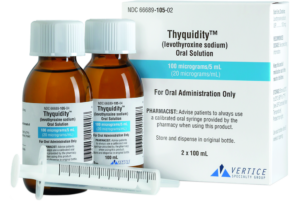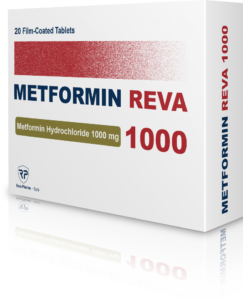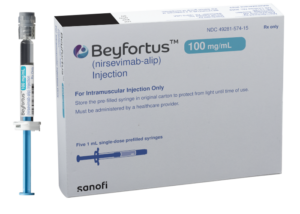Levothyroxine
Levothyroxine is a synthetic form of the thyroid hormone thyroxine (T4), used to treat thyroid hormone deficiency, commonly known as hypothyroidism. It is one of the most frequently prescribed medications worldwide.
Brand Names : Synthroid, Levoxyl, Eltroxin, Euthyrox, Tirosint, Unithroid and Tirosint-SOL among others.
While all of these brands contain the same active ingredient (levothyroxine), there may be differences in the inactive ingredients, formulation, and absorption. Some patients may respond better to one brand than another. Switching between brands or from a brand to a generic version (or vice versa) should be done with caution and under the guidance of a healthcare provider, as it might necessitate retesting and dose adjustments.
Levothyroxine Uses
- Primary Hypothyroidism: This is when the thyroid gland doesn’t produce enough hormones. This can be due to various causes like Hashimoto’s thyroiditis, surgical removal of the thyroid, or radiation therapy.
- Secondary Hypothyroidism: Here, the pituitary gland doesn’t release enough thyroid-stimulating hormone (TSH) which in turn stimulates the thyroid to produce hormones.
- Tertiary Hypothyroidism: This is less common and is due to a dysfunction in the hypothalamus, another part of the brain that releases a hormone to stimulate the pituitary gland.
- Congenital Hypothyroidism: Newborns might be born with an underactive thyroid or without a thyroid gland.
- Goiter: Levothyroxine can be used to treat an enlarged thyroid gland.
Dosage and Administration
 The initial dose and subsequent dosing of levothyroxine are determined by various factors like age, weight, the severity of hypothyroidism, and other existing health conditions. Regular monitoring of TSH levels in the blood is essential to ensure optimal dosing.
The initial dose and subsequent dosing of levothyroxine are determined by various factors like age, weight, the severity of hypothyroidism, and other existing health conditions. Regular monitoring of TSH levels in the blood is essential to ensure optimal dosing.
Usual Adult Does
- Initial dose: For otherwise healthy adults younger than 50 years and those older than 50 years but without heart disease, the initial recommended dose is often between 50 to 100 mcg/day.
- Maintenance dose: The typical full replacement dose for adults is about 1.6 mcg/kg/day. Therefore, for a 70 kg person, the approximate replacement dose would be around 112 mcg/day. However, older patients or those with cardiovascular conditions may require less.
Elderly and patients with cardiovascular diseases
- Initial dose: Usually, a lower starting dose, such as 25 to 50 mcg/day, is recommended. This dosage may be increased gradually and cautiously.
- Maintenance dose: These individuals may require less than 1 mcg/kg/day.
Pediatric Dose
- Neonates: The typical dose range for congenital hypothyroidism is 10 to 15 mcg/kg/day.
- Children (1-5 years): Generally, they may require doses of 5 to 6 mcg/kg/day.
- Children (6-12 years): Doses are typically 4 to 5 mcg/kg/day.
- Teenagers: Often need doses closer to the adult range.
Pregnant Women: Pregnant women with hypothyroidism often need an increased dosage of levothyroxine. It’s crucial for them to work closely with their healthcare provider to ensure optimal thyroid function during pregnancy.
Note: The goal of levothyroxine therapy is to restore the patient’s serum TSH level to the normal range. It’s essential for patients on levothyroxine to have their TSH and free T4 levels checked periodically to ensure they are on the right dose.
Side Effects
Over-replacement or under-replacement can lead to symptoms. Some potential side effects include:
- Over-replacement: Can lead to symptoms of hyperthyroidism like rapid heart rate, anxiety, weight loss, and insomnia.
- Under-replacement: Symptoms can be fatigue, weight gain, cold intolerance, and dry skin.
Regular monitoring helps in adjusting the dose to avoid these side effects.
Important Considerations
- Consistency is Key: It’s crucial to take levothyroxine consistently, preferably on an empty stomach and at the same time each day.
- Interactions: Certain medications and foods can interfere with levothyroxine absorption, such as calcium and iron supplements, antacids, and some foods like soy.
- Pregnancy: Thyroid hormone requirements may change during pregnancy. If you’re pregnant or planning to become pregnant, notify your doctor to monitor and adjust your dosage accordingly.
Medarchive.us does not assume any responsibility for any aspect of healthcare administered with the aid of materials provided. The information contained herein is not intended to cover all possible uses, directions, precautions, warnings, drug interactions, allergic reactions, or adverse effects. The information provided on our Web or Videos does not endorse drugs, diagnose patients, or recommend therapy. If you have questions about the medication you are taking or want to start as treatment, check with your doctor or medical health care provider.







